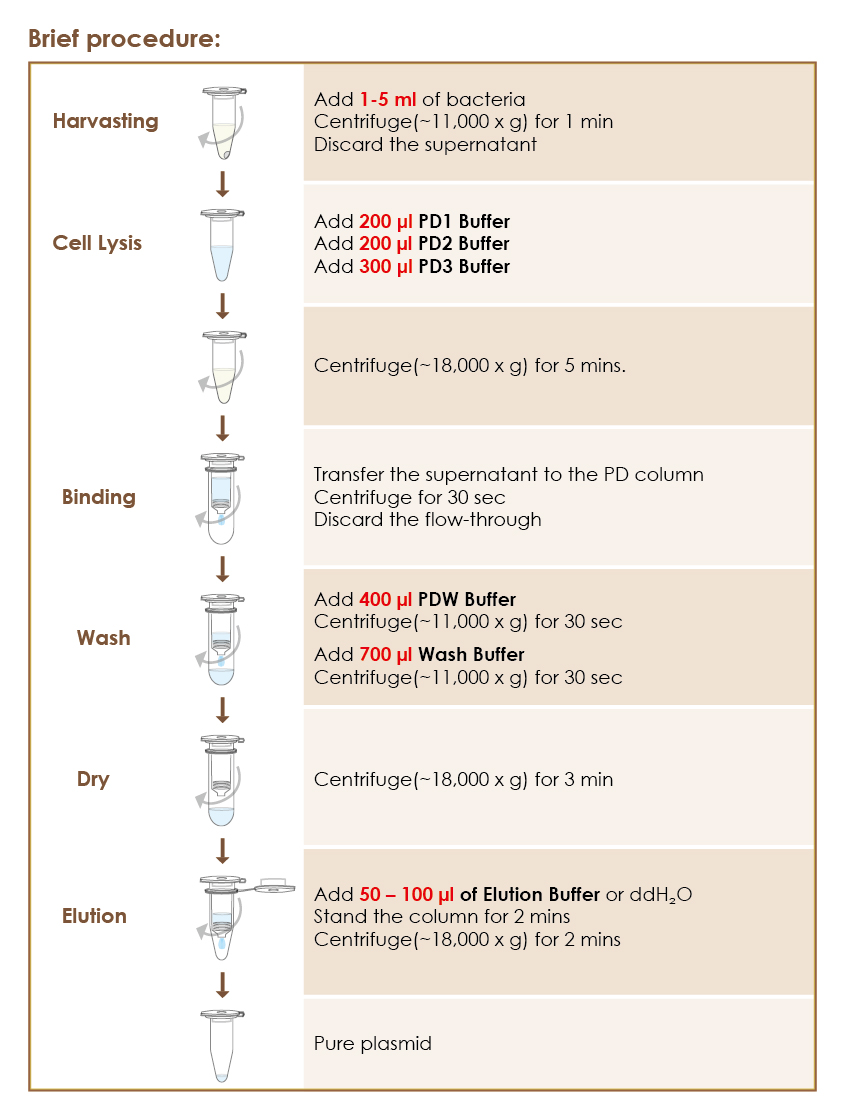| APPDE 004 | APPDE 050 | APPDE 100 | APPDE 300 | |
| PD1 Buffer | 1.0 ml | 13 ml | 25 ml | 75 ml |
| PD2 Buffer | 1.0 ml | 13 ml | 25 ml | 75 ml |
| PD3 Buffer | 1.5 ml | 18 ml | 35 ml | 105 ml |
| PDW Buffer | 1.3 ml | 23 ml | 45 ml | 135 ml |
| Wash Buffer (concentrate) | 1.0 ml | 10 ml | 20 ml | 50 ml |
| Elution Buffer | 0.5 ml | 7 ml | 15 ml | 35 ml |
| PD Column | 4 pcs | 50 pcs | 100 pcs | 300 pcs |
| Collection Tube | 4 pcs | 50 pcs | 100 pcs | 300 pcs |
| RNase A (Lyophilized) | 0.15 mg | 1.25 mg | 2.5 mg | 7.5 mg |
| User Manual | 1 | 1 | 1 | 1 |

※ Principle : mini spin column (silica matrix)
※ Sample size : 1 ~ 3 ml
※ Size of plasmid or construct : < 15 kb
※ Operation time : < 25 minutes
※ Typical Yield : 20 ~ 30 μg
※ Binding capacity : 60 μg/ column
※ Column applicability : centrifugation and vaccum
Important Notes:
※ Store RNase A at -20 °C upon recipit of kit.
※ Add 0.5 ml of PD1 Buffer to a RNase A tube, Dissolve the RNase A by vortexing. Briefly spin the tube and transfer the total RNase A mixture back to the PD1 bottle, mix well by vortexing and store the PD1 buffer at 4 °C.
※ If precipitates have formed in PD2 Buffer, warm the buffer in 37°C waterbath to dissolve precipitates.
※ Preparation of Wash Buffer by adding 96 ~100% ethanol (not provided) for first use.
※ Centrifugation steps are done by a microcentrifuge capable of the speed at 11,000 ~1,8000 x g.
|
Problems |
Possible reasons |
Solutions |
|
Low yield |
Too many bacterial cells were used (OD600 > 10). Separate the bacterial culture into multiple tubes.
After PD3 Buffer addition, break up the precipitate by inverting to ensure higher yield. |
|
|
Overgrown of bacterial cells |
Incubation time should not be longer than 16 hours. |
|
|
Bacterial cells were insufficient |
Ensure that bacterial cells have grown to an expected amount (OD600 > 1) after incubation under suitable shaking modes. |
|
|
Incorrect DNA elution step |
Ensure that Elution Buffer was added and absorbed to the center of the PD Column matrix. |
|
|
Incomplete DNA Elution |
If the size of DNA fragments is larger than 10 kb, use a preheated Elution Buffer (60~70°C) on the solution step to improve the elution efficiency. |
|
|
Incorrect preparation of Wash Buffer |
Ensure that the correct volume of ethanol (96 ~ 100 %) was added to Wash Buffer before use. |
|
|
Eluted DNA does not perform well |
Residual ethanol contamination |
After Wash Step, dry the PD Column with an additional centrifugation at top speed (~18,000 x g) for 5 minutes or incubation at 60°C for 5 minutes. |
|
Genomic DNA Contamination |
Lysate prepared improperly |
Gently invert the tube after adding the PD2 Buffer. And the incubation time should not be longer than 5 minutes.
Do Not use overgrown bacterial culture. |
|
RNA Contamination Plasmid DNA |
Insufficiency of RNase A activity in PD1 Buffer because of long-term storage |
Prior to using PD1 Buffer, ensure that RNase A was added. If RNase A added PD1 Buffer is out of date, add additional RNase A into PD1 Buffer to a concentration of 50 μg/ ml then store 4°C.
Too many bacterial cells were used, reducing sample volume.
|
|
Smearing or degrading of Plasmid DNA |
Nuclease contamination |
If used host cells have high nuclease activity (e.g., enA+ strains), perform the following optional Wash Step to remove residuary nuclease.
a. After DNA Binding Step, add 400 μl of PWD Buffer into the PD Column and incubate for 2 minutes at room temperature. b. Centrifuge at full speed (~18,000 xg) for 30 seconds. c. Proceed to step 6.2. |
|
Plasmid DNA is not adequate for enzymatic digestions |
Eluted plasmid DNA contains residual ethanol |
Make sure you have discarded the flow-through after washing with Wash Buffer (Step 6.2) and centrifuged for an additional 3 minutes (Step 7). |
|
Denatured Plasmid DNA migrate faster than supercoiled form during electrophoresis |
Incubation in PD2 Buffer too long |
Do not incubate the sample longer than 5 minute in PD2 Buffer |

E-mail: sales@alphagen.bio
Mobile:+886-982-951-501
TEL:+886-8-736-7106
FAX:+886-8-736-7152
No. 82, Ln. 11, Tantou Rd., Changzhi Township, Pingtung County 908, R.O.C.
ALPHAGEN Biotech will establish distributors in Japan, Korea, India, Europe, Pakistan, China & USA and covers 30+ countries with dedicated distributors.
 Home
About
Product
Home
About
Product
